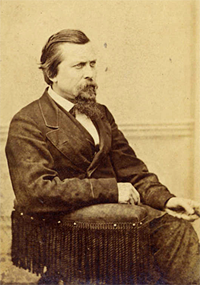About this Blog
 I entirely and with perfect good faith consider the issues growing out of the war, or rather the issues that led to it, or which brought it about, as practically settled and disposed of.
I entirely and with perfect good faith consider the issues growing out of the war, or rather the issues that led to it, or which brought it about, as practically settled and disposed of.
— Former Confederate Major General John G. Walker, 1866
I’m a native-born and lifelong Texan, with some branches of my family here stretching back to the days of the Republic. All of my family, on both sides and going back half-a-dozen generations, are Southerners, from Texas, Virginia, Alabama, Georgia, Florida and elsewhere, with a few border state folks from Missouri thrown in for good measure. I’ve got more Confederate ancestors, both direct and collateral, than I’ve been able to identify and count up so far. Some of them came from slaveholding families. They served in some of the best-known units of the war, including the Eighth Texas Cavalry (Terry’s Rangers), the Fourth Texas Infantry in Hood’s Brigade, and Walker’s Greyhounds. In time and geography, their aggregate service spans the entire war, from First Manassas to after Appomattox, from Miller’s Cornfield to the Siege of Vicksburg to the boulder-strewn slope of Little Round Top. My own educational background is in history (undergrad and some graduate work) and museum work (master’s degree), although I now work in an entirely different field. In recent years I’ve done considerable work in underwater archaeology.
I have no use for the Lost Cause. I grew up with it; I learned early on that Grant was a drunk, and Sherman was a monster. The pervasiveness of slavery, which tainted all, was rarely discussed. We were never actually defeated, I was told; “they starved us out.” I don’t think my late-20th-century family actually bought into this foolishness much, but felt obligated to pass it along, as it had been to them. But in my family, at least, it ends with me. There’s far too much good history out there to ignore for the sake of romanticism and hagiography.
Twenty years ago, the late Shelby Foote told filmmaker Ken Burns why, more than a century after the last shots were fired, the Civil War remains not only relevant, but central to Americans’ identity:
Any understanding of this nation has to be based, and I mean really based, on an understanding of the Civil War. And I believe that firmly. It defined us. The Revolution did what it did, our involvement in European wars beginning with the First World War did what it did, but the Civil War defined us as what we are, and it opened us to being what we became, good and bad things. And it is very necessary, if you’re going to understand the American character in the twentieth century, to learn about this enormous catastrophe of the mid-nineteenth century. It was the crossroads of our being, and it was a hell of a crossroads.
I believe that as well, and as a result I see in that conflict the seeds of many of the problematic issues we deal with today. A hundred and fifty years later, the American Civil War remains relevant to us all.
This blog is my attempt to explore that conflict and its legacy. I hope that readers will not confuse my general irreverence with a lack of seriousness. That would be a mistake, because the Civil War is the most horrific event that’s occurred in this nation’s history. This blog exists as much to clarify my own thinking as it is to inform others, and if my writing here seems muddled and even contradictory at times, that’s because my own thinking on the war — and my own Southern heritage — is a work in progress. As much as anything else, this blog is a chronicle of that process.
Image: Major General John G. Walker, Houston, Texas, c. 1865. Lawrence T. Jones III Texas Photography Collection, Southern Methodist University.




